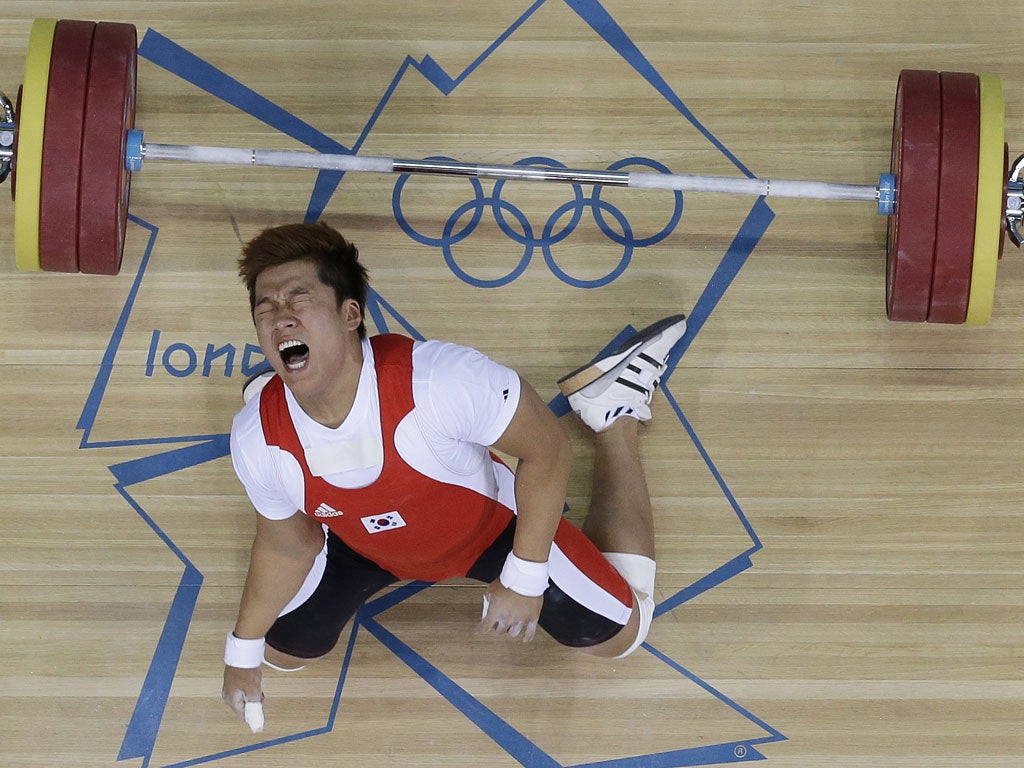Chris Hewett: Carnage at the clean and jerk – and no sign of any elbow room
The critic without a ticket: Clive James is the funniest thing ever produced by Australia, with the exception of its beer

It was Clive James, quite the funniest thing ever produced by Australia with the obvious exception of its beer, who said Arnold Schwarzenegger looked like "a big brown condom filled with walnuts". The memory of that witheringly brilliant one-liner re-emerged from the mists during a weightlifting session at the ExCel: the men's middleweight 77kg competition, to be strictly accurate – an event populated by men constructed on a more modest scale than the Austrian-American bodybuilder, actor, businessman and state governor, but infinitely stronger. How can we best describe them? With due deference to Mr James, how about "small condoms stuffed with coconuts"?
There cannot be a commentator anywhere at the BBC, on television or radio or deep in cyberspace, who has not used the words "fantastic", "amazing", "extraordinary" and "astonishing" at some point during these Games. Frequently, those calling the action have used all of them in the same sentence. This is ridiculous – or, in an age when it is not considered grammatically acceptable to use a single adjective when four are available, "ridiculous", "ludicrous", "preposterous" and "absurd". If everything is fantastic, it must follow that nothing is special. Try telling that to some of the higher achievers of the last few days: the cyclist Bradley Wiggins, say, or the swimmers Ye Shinwen and Yannick Agnel, or the rowers Helen Glover and Heather Stanning.
The Chinese lifter Lu Xiaojun is nothing if not special, as he demonstrated to the complete satisfaction of everyone who happened to watch him dominate his class here, setting Olympic and world records along the way. A 28-year-old former track athlete from Hubei – by all accounts, he was a sprinter well into his teens – Lu lists reading as his principal leisure activity. Presumably, he prefers Tolstoy's War and Peace to Mao's "Little Red Book", on the grounds that it improves the biceps as well as the mind.
Compelling as the gold medal-winning performance was, the real interest lay in the carnage elsewhere. The runner-up was a second Chinese contender, Lu Haojie, who took silver despite an ill-timed outbreak of orthodopaedic trauma that pretty much cost him the use of one arm – a not inconsiderable disadvantage, you will agree. This second Lu was in so much pain he could not drag himself to his feet for the final lift of the "snatch" section, but as he still needed to record a score of some description in the "clean and jerk" to secure a medal, his coaches shoved him back into the auditorium and ordered him to get on with it. When these people balance national duty against duty of care, there is only one winner.
This was not the half of it, though. The reigning champion, Sa Jae-hyouk of South Korea, dislocated his right elbow while trying to propel some hideously Bunteresque weight towards the London night sky. "Let's hope he's not so badly hurt he can't continue," remarked the summariser Non Evans, a woman of many parts, all of them scary, having represented Wales at rugby, judo and freestyle wrestling, as well as weightlifting. It seemed she had missed the fact that the poor sod's humerus was pointing at an angle previously unknown to geometry.
Officials attempted to shield the prostrate Sa from the prying eyes of the public by placing an Olympic banner across the front of the lifting platform, just as Aintree flunkies conceal dying horses under something the size of a wedding marquee as the annual stampede of the Grand National continues around them. But the officials were just a little too late and their banner was far too small for its task: the fine detail was all there for all to see, and all of it was gruesome.
So what are we to make of weightlifting as an Olympic discipline? Does its inherent theatricality absolve it of its dope-riddled history? Now, there's a question. Three times in the last couple of decades, those who run the sport at international level have attempted to give it a clean slate by changing weight categories and erasing records, but anyone who spends half an hour at the local gym surrounded by strong men in leotards making themselves even stronger by consuming a seemingly endless variety of powders and potions cannot help but wonder who among the world's elite might be taking what.
And yet. There was something captivating about that 77kg contest, especially for those viewers able to follow the cameras into the inner sanctum backstage, where the lifters pretended to ignore each other while secretly engaging in an advanced form of psychological poker. Ivan Cambar Rodriguez of Cuba, the eventual bronze medallist and a performer of considerable panache, was the undisputed master of these mind games, illuminatingly explained by Colin Bryce, whose voice grew so gravelly at moments of excitement that he made the track and field commentator Paul Dickenson sound like Kiri Te Kanewa.
Sadly from Bryce's perspective, these Olympics do not present the challenge they might have done, owing to the fact that Thailand's gold medallist in the women's featherweight competition at the Beijing Games four years ago is not in London to defend her title. Her name? Prapawadee Jaroenrattanatarakoon. Try saying that after a pint. Even an Australian pint.
Subscribe to Independent Premium to bookmark this article
Want to bookmark your favourite articles and stories to read or reference later? Start your Independent Premium subscription today.

Join our commenting forum
Join thought-provoking conversations, follow other Independent readers and see their replies